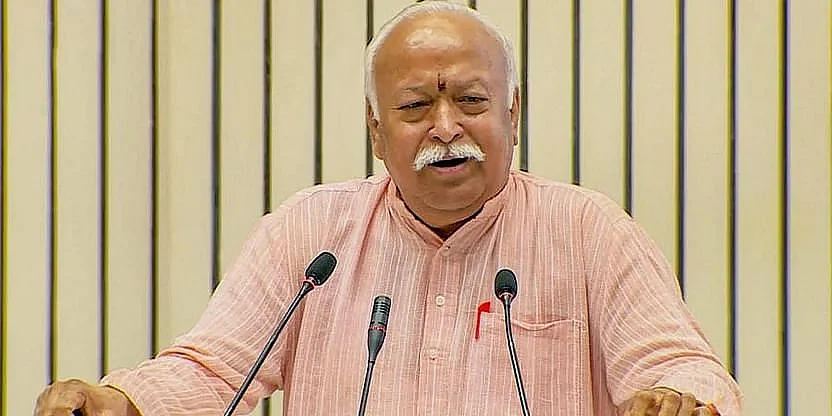The Rashtriya Swayamsevak Sangh, just three years away from its centennary, is attempting to change its image. Nothing underlines the fact more than sarsanghchalak Mohan Rao Bhagwat’s Vijayadashami speech last week, pitching for equal participation of women and categorically condemning anti-minority agendas. The message is that the RSS is very much in sync with the times, both in terms of ‘look’ and outlook.
Mr Bhagwat has changed more than the RSS uniform (eschewing floppy shorts in favour of pants). He has taken public engagement to a whole new level, proactively reached out to minorities and batted for population stabilisation. While his meetings with Muslim community leaders have been in the news of late, his efforts to present a liberal and inclusive face of the sangh began in 2018, with a three-day series of lectures called ‘Future of Bharat: an RSS Perspective’.
It was the first time that the RSS, typically reticent, had attempted public engagement at that scale. The major takeaway was an explicit disavowal of hardline aspects of ‘Guruji’ Golwalkar’s doctrinal philosophy, specifically those that ‘other’ (Christian and Muslim) minorities.
Escalating interaction with members of the minority community, Mr Bhagwat met with prominent Muslim intellectuals in 2019 and again in August this year, the agenda being to further mutual understanding and air concerns. He followed it up last month with a visit to a madrasa run by the All India Imam Organisation, and had a long chat with its chief Umer Ahmed Ilyasi. The two had met before, but it was the first time that the sarsanghchalak had visited a Muslim school.
Mr Bhagwat’s Vijaydashami speech is an annual event that has acquired significance ever since the NDA government came to power, given that the sangh is believed to exercise considerable influence over matters of policy. Many regard it as a sort of ‘state of the union’ address, and analyse it for clues on the RSS-BJP equation, or the shape of things to come.
This year’s address stood out for its clear espousal of women and minorities. For one thing, the chief guest was a woman – the eminent mountaineer Santosh Yadav. A frequent criticism of the RSS has been its tendency to valorise women as mothers of sons and exemplary homemakers. Mr Bhagwat turned that notion on its head, castigating men for seeking to confine women to the kitchen. He made a clear pitch for participation of women in the economy, and equity in decision-making.
Describing conservatism as the enemy of progress, he said outdated notions have to be ‘cast away’. It would be too much to hope that his words were a subtle indictment of retrogressive notions like ‘love jihad’ or the ill-conceived surrogacy laws, which effectively infantilise women and undermine their autonomy under the garb of protecting them. But it is a start, and his categorical support for population control across communities is in stark contrast to a predecessor urging Hindu women to have more children!
Mr Bhagwat also warned against undermining national unity by setting sections of society against each other. In the context of attempts to whip up sentiments against minorities after the horrific beheading of a tailor in Udaipur by Muslim radicals, he said ‘a community as a whole’ cannot be held accountable for such incidents. He pointed to condemnatory voices from within the minority community itself, and said that Hindus neither threaten, nor feel threatened.
The statement was particularly welcome, given that the victim, Kanhaiya Lal, was killed for having supported former BJP spokesperson Nupur Sharma, who was sacked for her comments on Prophet Muhammad. Although her ouster has annoyed many within the sangh, Mr Bhagwat’s speech indicates that the RSS and BJP are on the same page on the minority question.
While Mr Bhagwat’s Muslim outreach is certainly politically expedient, given the compulsion to stay on good terms with the Middle East, it is also pragmatic from the social harmony point of view. We tend to forget that a bare handful of pro-Khalistan militants held the country to ransom for years on end, disrupting normal life with bomb blasts and gun violence. A disgruntled minority of a significant size is simply unimaginable.
The question is not one of peaceful coexistence; that’s a given. What needs to be addressed is the trope of an ‘alienated’ Muslim minority, which serves to feed a sense of alienation. This is patently absurd. Why should India’s second largest community, well-integrated in the bureaucracy, military, academia and sports – the national cricket team for instance – feel alienated, simply because the BJP has proved electorally successful?
That said, there have been incidents of miscreants harassing or attacking Muslims, and neither law enforcement agencies nor politicians have responded adequately. Bhagwat’s stern message will hopefully put pressure on them to make an example of minority-baiters. Even a single incident of assault is one too many, and calls for a severe crackdown on the perpetrators. Minorities, for their part, must be equally vocal in condemning Islamist radicals, to avoid contributing to an atmosphere of polarisation.
Some analysts have read Bhagwat’s speech, coupled with the BJP’s outreach to pasmanda Muslims through government welfare schemes, as an attempt to split the minority vote. If so, it certainly cannot condone harassment of or violence against the pasmandas.
The RSS leadership has shown flexibility in its approach to women and minorities, but will the rank-and-file internalise the message and follow suit?
Bhavdeep Kang is a senior journalist with 35 years of experience in working with major newspapers and magazines. She is now an independent writer and author






